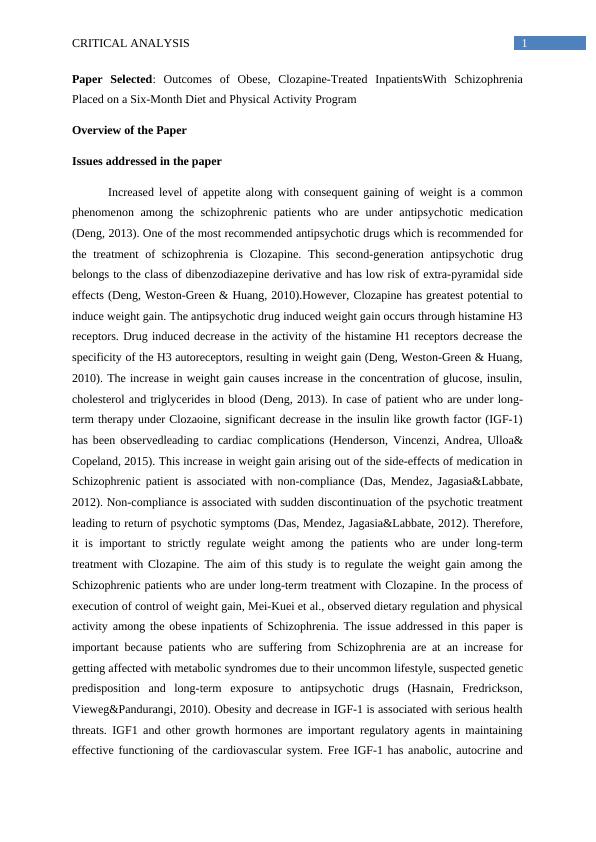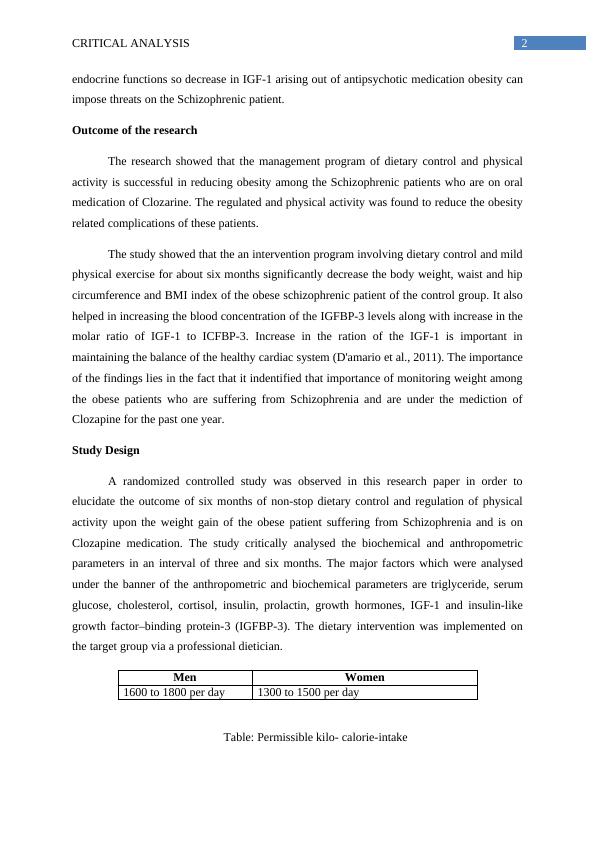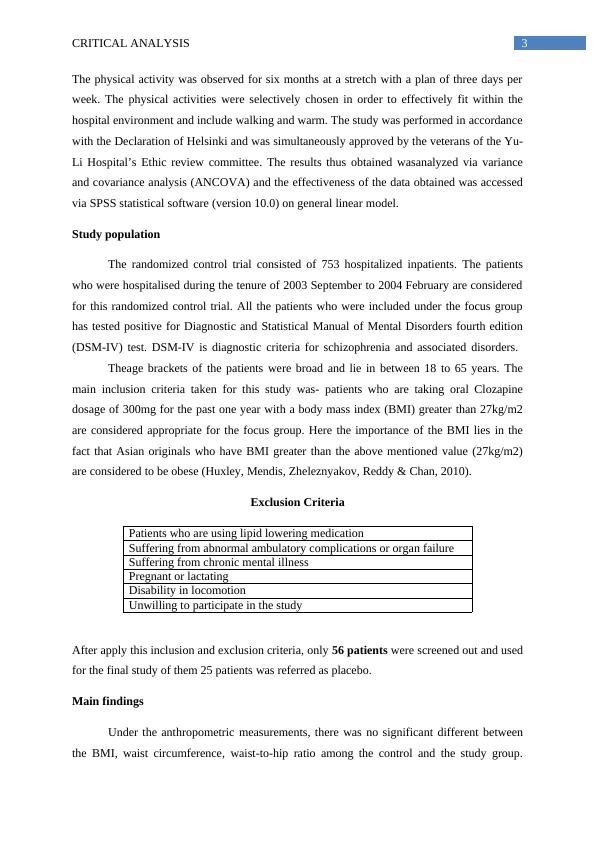Critical Analysis of Clozapine Treated Inpatients PDF
10 Pages3392 Words39 Views
Added on 2020-04-29
Critical Analysis of Clozapine Treated Inpatients PDF
Added on 2020-04-29
ShareRelated Documents
1CRITICAL ANALYSISPaper Selected: Outcomes of Obese, Clozapine-Treated InpatientsWith SchizophreniaPlaced on a Six-Month Diet and Physical Activity ProgramOverview of the PaperIssues addressed in the paperIncreased level of appetite along with consequent gaining of weight is a commonphenomenon among the schizophrenic patients who are under antipsychotic medication(Deng, 2013). One of the most recommended antipsychotic drugs which is recommended forthe treatment of schizophrenia is Clozapine. This second-generation antipsychotic drugbelongs to the class of dibenzodiazepine derivative and has low risk of extra-pyramidal sideeffects (Deng, Weston-Green & Huang, 2010).However, Clozapine has greatest potential toinduce weight gain. The antipsychotic drug induced weight gain occurs through histamine H3receptors. Drug induced decrease in the activity of the histamine H1 receptors decrease thespecificity of the H3 autoreceptors, resulting in weight gain (Deng, Weston-Green & Huang,2010). The increase in weight gain causes increase in the concentration of glucose, insulin,cholesterol and triglycerides in blood (Deng, 2013). In case of patient who are under long-term therapy under Clozaoine, significant decrease in the insulin like growth factor (IGF-1)has been observedleading to cardiac complications (Henderson, Vincenzi, Andrea, Ulloa&Copeland, 2015). This increase in weight gain arising out of the side-effects of medication inSchizophrenic patient is associated with non-compliance (Das, Mendez, Jagasia&Labbate,2012). Non-compliance is associated with sudden discontinuation of the psychotic treatmentleading to return of psychotic symptoms (Das, Mendez, Jagasia&Labbate, 2012). Therefore,it is important to strictly regulate weight among the patients who are under long-termtreatment with Clozapine. The aim of this study is to regulate the weight gain among theSchizophrenic patients who are under long-term treatment with Clozapine. In the process ofexecution of control of weight gain, Mei-Kuei et al., observed dietary regulation and physicalactivity among the obese inpatients of Schizophrenia. The issue addressed in this paper isimportant because patients who are suffering from Schizophrenia are at an increase forgetting affected with metabolic syndromes due to their uncommon lifestyle, suspected geneticpredisposition and long-term exposure to antipsychotic drugs (Hasnain, Fredrickson,Vieweg&Pandurangi, 2010). Obesity and decrease in IGF-1 is associated with serious healththreats. IGF1 and other growth hormones are important regulatory agents in maintainingeffective functioning of the cardiovascular system. Free IGF-1 has anabolic, autocrine and

2CRITICAL ANALYSISendocrine functions so decrease in IGF-1 arising out of antipsychotic medication obesity canimpose threats on the Schizophrenic patient. Outcome of the researchThe research showed that the management program of dietary control and physicalactivity is successful in reducing obesity among the Schizophrenic patients who are on oralmedication of Clozarine. The regulated and physical activity was found to reduce the obesityrelated complications of these patients. The study showed that the an intervention program involving dietary control and mildphysical exercise for about six months significantly decrease the body weight, waist and hipcircumference and BMI index of the obese schizophrenic patient of the control group. It alsohelped in increasing the blood concentration of the IGFBP-3 levels along with increase in themolar ratio of IGF-1 to ICFBP-3. Increase in the ration of the IGF-1 is important inmaintaining the balance of the healthy cardiac system (D'amario et al., 2011). The importanceof the findings lies in the fact that it indentified that importance of monitoring weight amongthe obese patients who are suffering from Schizophrenia and are under the mediction ofClozapine for the past one year. Study DesignA randomized controlled study was observed in this research paper in order toelucidate the outcome of six months of non-stop dietary control and regulation of physicalactivity upon the weight gain of the obese patient suffering from Schizophrenia and is onClozapine medication. The study critically analysed the biochemical and anthropometricparameters in an interval of three and six months. The major factors which were analysedunder the banner of the anthropometric and biochemical parameters are triglyceride, serumglucose, cholesterol, cortisol, insulin, prolactin, growth hormones, IGF-1 and insulin-likegrowth factor–binding protein-3 (IGFBP-3). The dietary intervention was implemented onthe target group via a professional dietician.MenWomen1600 to 1800 per day1300 to 1500 per dayTable: Permissible kilo- calorie-intake

3CRITICAL ANALYSISThe physical activity was observed for six months at a stretch with a plan of three days perweek. The physical activities were selectively chosen in order to effectively fit within thehospital environment and include walking and warm. The study was performed in accordancewith the Declaration of Helsinki and was simultaneously approved by the veterans of the Yu-Li Hospital’s Ethic review committee. The results thus obtained wasanalyzed via varianceand covariance analysis (ANCOVA) and the effectiveness of the data obtained was accessedvia SPSS statistical software (version 10.0) on general linear model.Study populationThe randomized control trial consisted of 753 hospitalized inpatients. The patientswho were hospitalised during the tenure of 2003 September to 2004 February are consideredfor this randomized control trial. All the patients who were included under the focus grouphas tested positive for Diagnostic and Statistical Manual of Mental Disorders fourth edition(DSM-IV) test. DSM-IV is diagnostic criteria for schizophrenia and associated disorders. Theage brackets of the patients were broad and lie in between 18 to 65 years. Themain inclusion criteria taken for this study was- patients who are taking oral Clozapinedosage of 300mg for the past one year with a body mass index (BMI) greater than 27kg/m2are considered appropriate for the focus group. Here the importance of the BMI lies in thefact that Asian originals who have BMI greater than the above mentioned value (27kg/m2)are considered to be obese (Huxley, Mendis, Zheleznyakov, Reddy & Chan, 2010). Exclusion CriteriaPatients who are using lipid lowering medicationSuffering from abnormal ambulatory complications or organ failureSuffering from chronic mental illnessPregnant or lactatingDisability in locomotionUnwilling to participate in the studyAfter apply this inclusion and exclusion criteria, only 56 patients were screened out and usedfor the final study of them 25 patients was referred as placebo. Main findingsUnder the anthropometric measurements, there was no significant different betweenthe BMI, waist circumference, waist-to-hip ratio among the control and the study group.

End of preview
Want to access all the pages? Upload your documents or become a member.
Related Documents
Schizophrenialg...
|16
|4168
|125
400417 - Epidemiology and Quantitative Methodslg...
|12
|3177
|115
Weight increase among schizophrenia patients with clozapine treatmentlg...
|12
|2981
|82
400417 Epidemiology and Quantitative Methodslg...
|11
|3531
|128
Assignment on Epidemiologylg...
|12
|3618
|48
Cardiovascular Disease in Older Adults with Dementia and Antipsychotic Medication Uselg...
|12
|3455
|474
